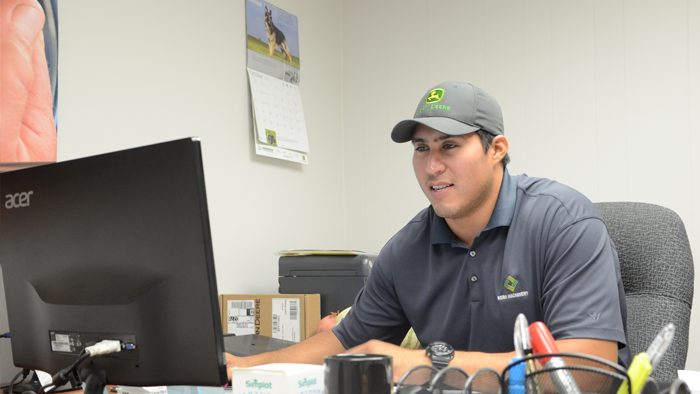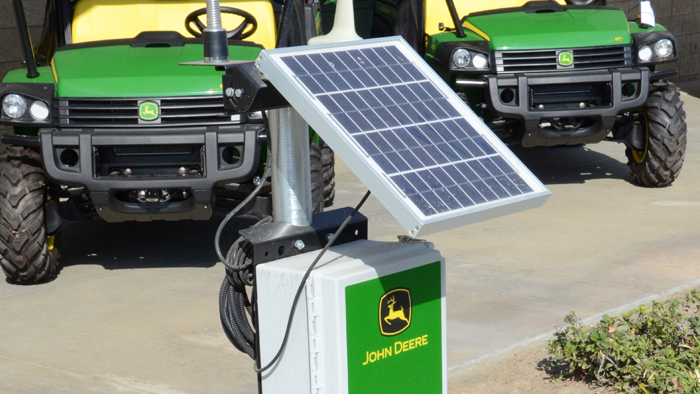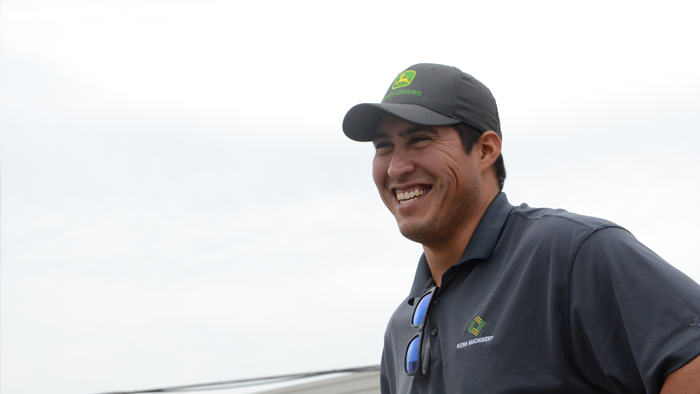Editor's Note: This article is part of Farm Equipment's Dealership Minds coverage. For complete coverage of our visit with Kern Machinery, visit DealershipMinds.com.
Joel Turrubiates, Precision Farming Specialist
Years with Organization: 2, After graduating in 2012 with a degree in business marketing, Joel Turrubiates spent several months working for a large corporate insurance agency, but wanted to apply his professional skillset to a more “hands-on” industry. He started with Kern Machinery’s Delano store in 2014 as an Ag Management Solutions (AMS) consultant. In March 2015, he was promoted to Integrated Solutions Manager, overseeing precision farming operations at the dealership’s 4 California stores, along with the 3 recently acquired Camp Equipment stores in Oregon and Idaho.
Role: “I’m in charge of our precision farming operations and do everything I can to contribute to the company. We’re in the business of providing service and support for our customers, and also being profitable. What I really enjoy about this job is I get to go out a lot and be out in the field and get my hands dirty.”
Exclusive videos with Joel Turrubiates
With a pair of GPS receiver globes resting on a shelf, an unopened touchscreen display tucked in the corner and a handy assortment of connectors and harnesses within arm’s reach, Joel Turrubiates’ office resembles that of most precision farming specialists.
But the similarities largely end there. Unlike many of his precision brethren in other parts of North America, the Integrated Solutions Manager at Kern Machinery’s Delano, Calif., store hasn’t enjoyed the same rapid adoption or prolonged farm technology sales boom.
“Precision ag hasn’t really taken off in California like it has in the Midwest,” Turrubiates says. “We have our loyal customers, but it’s a different culture out here with unique equipment, diverse crops and multi-million dollar companies running farms instead of families.”
On the surface, these factors would seem to pose obstacles to increasing revenue, but Turrubiates prefers to view them as opportunities. During the course of our conversation, it was clear that despite being a relative newcomer to the agricultural business, Turrubiates has the motivation and mindset to move the needle on Kern Machinery’s precision profitability.
Joel Turrubiates, integrated solutions manager for Kern Machinery in Bakersfield, Calif., gives a brief overview of how precision ag differs between southern California and the Corn Belt. This video is part of the Dealership Minds Video Series, brought to you by Charter Software.
“My goal for total sales is to double our revenue in the next couple years,” he says. “I think that if we keep pursuing some of the projects we have going, and they are successful, that goal should be reached easily because demand will be there.”
Finding a Niche
Hired as an Ag Management Solutions (AMS) consultant in 2014, Turrubiates initially split his time between sales and service, cutting his precision teeth under store sales manager Matt Godinho.
“He (Matt) was juggling the two positions, sales manager and Integrated Solutions Manager, and the decision was made that we needed somebody else who could be devoted full-time to the precision department,” Turrubiates says. “So in March 2015, they made me the Integrated Solutions Manager, which definitely added some pressure.
“Even though I don’t have anyone reporting to me, my decisions affect the company and they’ve got to be financially wise decisions. I’m still learning and try to take advantage of the experience we have here to meet the expectations that (owner) Clayton (Camp) has for this to be a profitable part of the company.”
While it’s been a sometimes steep, and continuous learning curve, Turrubiates is focused on helping the dealership find its precision niche. Most days, he divides his time between installing or troubleshooting the dealership’s cornerstone precision products — GPS receivers and John Deere’s Field Connect moisture monitoring systems.
Some corporate customers, primarily vegetable growers, will purchase 10-15 receivers at a time and pay an annual fee for RTK subscriptions, which requires attentive service if a signal goes down.
The dealership maintains 6 RTK towers in California and subscription contracts state signals will never be down more than 24 hours. Turrubiates drives to each tower at least once a week to test the signal strength and connections.
Turrubiates responds to the question, "What keeps and integrated solutions manager up at night?" This video is part of the Dealership Minds Video Series, brought to you by Charter Software.
Turrubiates explains the dealerships efforts to incorporate the precision tools John Deere already offers into operations with permanent crops. This video is part of the Dealership Minds Video Series, brought to you by Charter Software.
“The last thing I want to have happen is to have a customer call telling me we’ve got some RTK tower problems because then the calls just multiply in a matter of minutes,” Turrubiates says. “Unfortunately, two of our base stations are on municipal water storages towers, which are owned by the water district. They will cycle power off and on at times so I’ve had customers in the middle of planting call because their signal went out. There’s not much I can do in those situations.”
One option Turrubiates is exploring to guard against sporadic failures is to convert the base stations to solar power. This would improve signal consistency for customers and give the dealership more control.
“We get sun 360 out of 365 days, so why not? We’re paying rent each month to have a base station on those water towers, but I’d prefer we be self-sufficient and have our own power.”
Proving Payback
With fewer row-crop farmers than in other parts of the country, and far more orchards and vineyards, there isn’t the same widespread demand for high-level precision guidance systems. This often requires a more creative approach to introducing farm customers to GPS technology.
Turrubiates stocks 6 rental GPS receivers and in-cab displays, which tend to be a popular option for customers who only need the systems for a short time for listing seed beds or planting. The dealership only charges a nominal per hour fee for the rental receivers and an in-cab display and tracks hourly usage through the JDLink online portal.
The rental program at Kern Machinery puts precision products in the hands of some farmers new to some of the technologies. Turrubiates talks about the program and how it has helped increase precision equipment sales. This video is part of the Dealership Minds Video Series, brought to you by Charter Software.
“Rent is applied to the total cost of the unit, so our goal is that after a year or so, the customer will purchase the system or we can sell it at a lower price to someone else,” Turrubiates says. “It’s an ongoing process, but we try to turn them over as quickly as possible and a $10,000 price tag is a lot more attractive than $20,000 for customers once they see the value the system provides.”
While GPS adoption is gradually increasing, interest in moisture monitoring probes has rapidly risen in recent months. With customers in Kern Machinery’s service area in the midst of a 4-year drought, Turrubiates is quoting the cost of more systems to farmers with crops thirsting for every drop of moisture they can get.
“We just quoted a customer the price for 60 systems and there’s a lot of potential for this technology in our area,” he says. “But the way we’re structured, if we sell a Field Connect system, the revenue goes to the sales department. Where I need to make my money is on the installation and the service side.”
Charging for an installation and a year’s worth of maintenance, service and education on the monitoring system are critical to developing the dealership’s precision business.
Farmers in California have been looking for help from technological advances to mitigate the impacts of drought conditions. Turrubiates talks about the Field Connect solutions that some farmers have found value in. This video is part of the Dealership Minds Video Series, brought to you by Charter Software.
“I have to keep selling those value added services and coming up with new ways to generate revenue, because that’s how I’m tracked and evaluated,” Turrubiates says. “At the same time, I rely heavily on the sales staff here to preach value added service, probably because I am a one-man team, and they can provide feedback from customers and that offers another touch point.”
Growing Pains
Many established precision dealers have moved from a “free to fee” model for precision service and Turrubiates says this is the mentality he’s working to instill at Kern.
“We haven’t had a complete buy-in yet as a company, but I know we’re not the only ones,” he says. “Our precision department is still pretty new, and it’s got to be a culture change for us.”
Being the primary precision specialist for the dealership’s 4 California locations (Bakersfield, Delano, Buttonwillow and Lancaster), Turrubiates typically sketches out his daily agenda, which often includes an on-farm demonstration or two and regular meetings with salespeople at each location.
But he’s also been dedicating more time to developing the precision farming departments at the recently acquired Camp Equipment stores in Burns and Ontario, Ore., and Weiser, Idaho. Managing precision operations for stores at least 11 hours away poses logistical challenges.
“Those stores are in their infancy with precision farming and we’re still trying to establish our footprint there,” Turrubiates says. “They never had anybody who specialized in technology products. I’ll get called frequently because I’m in charge of those stores and I’ve traveled there and back on several occasions, spending time with their salespeople.
“I’m hoping to have someone full-time in that area within 6 months because having someone split their time between sales and precision is going to make it difficult to grow business. ”
Oregon and Idaho also differ in the types of crops being grown, which has forced Turrubiates to get familiar with equipment not traditionally sold at the Kern stores such as hay balers and swathers. He’s also seen a different adoption curve for precision tools in that territory.
“Customers in that area tend to pay more attention to seeding data and varieties, whereas our California customers just plant,” Turrubiates says. “We don’t really see any variable-rate either, but I’m hoping we can change that, because it’s an untapped market here.”
Last summer, he helped set up a variable-rate compost spreader for orchards to apply gypsum. With the cost and care that goes into managing a high-dollar crop, Turrubiates says it makes sense that farmers would want to protect that investment as best they can.
Dealing with Diversity
Customer diversity — not only in terms of crops — also poses obstacles to more rapid precision adoption in the area. While Turrubiates has some family farm customers, many are corporate entities that rotate equipment operators each year, many of whom don’t speak English.
“One problem I run into fairly frequently is that companies don’t really want to spend the money for precision products because they know that their operators aren’t going to understand how to use them or they’ll use them incorrectly,” he says. “I can’t tell you how many times I’ve been out on a service call for the same company and it’s a different operator every time I stop out. In a lot of cases, they are migrant workers who will only be there for 6-9 months and then move on.”
On some days, Turrubiates is more of a teacher than a technician. He will take the time to walk operators through setups, mapping fields or creating boundaries, but is grateful when he encounters a customer who has baseline experience with GPS systems and displays.
Troubleshooting simple errors or giving tutorials on quick fixes comes with the territory, but Turrubiates says the end goal is to keep customers satisfied and coming back.
“That’s the main point — we’re there to help them out and give them the tools to be more profitable,” he says. “It all goes bask to our dealership’s motto ‘We deliver equipment and solutions.’ That’s the mentality I have and how I’m looking to build our precision farming department.”









![[Technology Corner] A Big Step Forward for Interoperability & Data Sharing](https://www.precisionfarmingdealer.com/ext/resources/2025/12/12/A-Big-Step-Forward-for-Interoperability--Data-Sharing.webp?height=290&t=1765565632&width=400)


